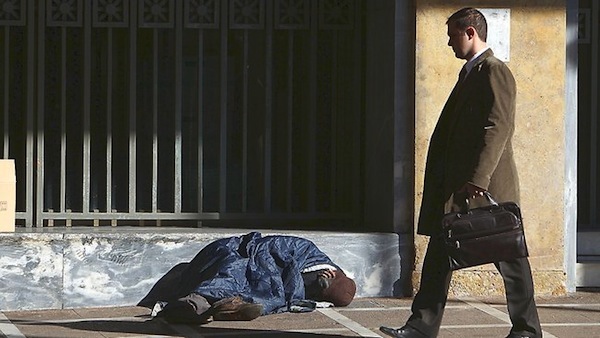ECB Meeting and Greek Elections Are Likely to Dominate at World Economic Forum
By Charles Forelle, Wall Street Journal
The annual meeting of the World Economic Forum in Davos officially tackles gauzy themes (“the new global context”), but one very concrete item will be on the unofficial agenda for the sixth year running: the travails of Greece and the eurozone.The coming few days will see two potentially dramatic events. One is Thursday’s meeting of the European Central Bank’s governing council, at which it may announce a program of government-bond buying. The other is Sunday’s election in Greece, in which the electorate may choose a party that promises to repudiate large portions of the policy prescription that Greece’s international rescuers have formulated.
Both reflect an uncomfortable reality: Despite apparent harmony in financial markets and in European policy-making, the crisis persists—far longer than many had expected.
Europe’s crisis-fighting has effectively quelled the financial-market panics that flared up in years past. Its reforms have made real steps toward repairing a broken banking system. But the economy hasn’t recovered, and six years is a long time to wait.
The consequence for the ECB has been an extended period of very low inflation—it has been below 1% across the eurozone since October 2013—that dipped into an outright fall in prices in December. Having exhausted conventional tools for boosting inflation back to its target of close to 2%, the ECB is reluctantly considering the quantitative easing used by the U.S., the U.K. and Japan.
The consequence for Greece has been very high unemployment—25% or more since September 2012. And thus the opposition party that surged from practically nowhere in the 2012 elections is on the cusp of winning, and of demanding significant change from Europe this time around.
For investors, the ECB’s quantitative-easing plan is probably the more immediate concern. ECB President Mario Draghi and ECB officials have spent months telegraphing that quantitative easing is coming, and markets have already adjusted to assume it will arrive: The euro has sunk to levels not seen since 2003, and the price of government bonds—led by German bonds—have soared to record levels on the expectation that they will be snapped up when it does.
Investors will be alert to the program’s heft. The focus will be on “the scale of it and the force that they are able to attach to it right from the start,” said Stephanie Flanders, chief market strategist for Europe at J.P. Morgan Asset Management.
A program that has no explicit limits will be more powerful than one accompanied by restrictions, Ms. Flanders said. Among other things, a limited program would be a signal to investors that Mr. Draghi wasn’t fully able to patch over the differences among the central bank’s policy makers.
Nonetheless, while many analysts are convinced quantitative easing should be done, fewer are convinced it will have a lasting effect. Making credit cheaper hasn’t yet forced substantial new lending.
One potential immediate boost, said Ms. Flanders, could come from a weaker euro. This helps Europe’s exporters and, significantly, makes the prices of imported goods higher, encouraging inflation. “To the extent that we’ve established this magical connection to the exchange rate, you could have a quite significant effect on inflation short term, and European equities,” she said.
If the opposition party Syriza wins on Sunday in Greece, the impact may only be clear down the road. For one thing, Greece’s fragmented political system means it may be hard to discern immediately how much power Syriza will ultimately have to push through its agenda. If the election is especially tight, it may not be able to form a government, which could trigger new elections.
Syriza’s message has shifted since 2012, but it is running on a platform of substantial renegotiation of Greece’s bailout program. Its central message is that the austerity-led policies prescribed by its rescuers and implemented by successive Greek governments haven’t worked and should be scrapped.
Near the top of its list is Greece’s huge debt, which is about 175% of gross domestic product. The bulk of it is owed to other eurozone countries and the International Monetary Fund. Most of it doesn’t have to be repaid for decades. The interest is low.
But Syriza argues that the debt is crushing Greece’s future prospects and should be renegotiated, which is to say partly forgiven. Germany and its creditor allies are firmly opposed, and the negotiations will be difficult—and will establish an important precedent for how other countries’ debt is treated.
A Syriza victory provides “more incentive for parties in Portugal and Italy to campaign with that point of view,” said Alberto Gallo, head of macro-credit research at the Royal Bank of Scotland in London. “Greece is not isolated.”









